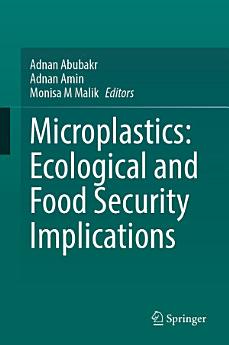Microplastics: Ecological and Food Security Implications
Über dieses E-Book
Microplastics: Ecological and Food Security Implications not only articulates the extent of the problem, but also develops practicable harm mitigation strategies. Expert researchers discuss the disruptions MPs cause in the food web, altering predator-prey dynamics and even the composition of aquatic environments, as accumulation of MPs in sediments impacts nutrient cycling. When MPs find their way into our food systems, they can cause physical effects such as effects such as internal blockages, damage to the digestive system, and impaired reproduction. Solutions-oriented, Microplastics: Ecological and Food Security Implications delves into tangible strategies to reduce plastic waste, improve waste management practices, and advocate for policy changes. By empowering readers with concrete measures, it encourages active participation in combating MP pollution.
Autoren-Profil
Professor (Dr.) Adnan Abubakr
Professor (Dr.) Adnan Abubakr is a distinguished academic and researcher currently serving as Professor of Limnology and Head of the Division of Aquatic Environmental Management, Faculty of Fisheries, Sher-e-Kashmir University of Agricultural Sciences and Technology of Kashmir (SKUAST-K). He holds both M.Sc. and Ph.D. degrees in Limnology from the Department of Limnology, Barkatullah University, Bhopal, with expertise in water and wastewater analysis, including analytical and bacteriological techniques applicable to freshwater and brackish water systems.
Dr. Abubakr specializes in the design and development of artificial wetland systems for wastewater treatment. With over 15 years of extensive experience in teaching, research, and extension in the field of aquatic ecology, he has significantly contributed to the advancement of aquatic environmental sciences. He played a pivotal role in establishing the M.F.Sc. and Ph.D. degree programs in Aquatic Environmental Management within the Division of AEM at SKUAST-K.
A prolific researcher, Dr. Abubakr has published more than 60 research papers in peer-reviewed journals. He has successfully completed two externally funded and three university-funded research projects and has supervised more than 20 postgraduate and doctoral students in their research pursuits.
Dr. Adnan Amin
Dr. Adnan Amin is an Assistant Professor cum Junior Scientist in the Division of Aquatic Environmental Management at the Faculty of Fisheries, Rangil, Ganderbal, Sher-e-Kashmir University of Agricultural Sciences and Technology—Kashmir (SKUAST-K). He earned his undergraduate degree from the College of Fishery Science Muthukur, Nellore, under Sri Venkateswara Veterinary University (SVVU), Tirupati, Andhra Pradesh. He completed his Master's at the College of Fisheries, Mangalore, specializing in Aquatic Environment Management, and obtained his Doctorate from the College of Fisheries, Ratnagiri, in the same field.
Dr. Amin's research interests encompass aquatic toxicology, limnology, and the impact of emerging contaminants on aquatic ecosystems. His significant contributions include studies on heavy metal and pesticide toxicity in aquatic organisms and the effects of climate change on aquatic biodiversity. He has published over 35 research papers in national and international peer-reviewed journals, along with five book chapters, ten review papers, and eighteen magazine articles.
In recognition of his academic excellence, Dr. Amin received a merit fellowship during his Master's program. He holds life membership in the Society of Fisheries and Life Science, College of Fisheries, Mangalore. His editorial contributions include co-editing books such as "Xenobiotics in Aquatic Animals: Reproductive and Developmental Impacts," "Food Security, Nutrition and Sustainability Through Aquaculture Technologies," and "Coldwater Fisheries and Aquaculture Management: Technology for Sustainable Food Production." Dr. Amin's work is widely cited, with his publications receiving numerous citations, reflecting his impact in the field of aquatic environmental management
Dr. Monisa M. Malik
Dr. Monisa M. Malik is currently serving as an Assistant Professor cum Junior Scientist in the Division of Aquatic Environmental Management, Faculty of Fisheries, Rangil, Ganderbal, Sher-e-Kashmir University of Agricultural Sciences and Technology - Kashmir (SKUAST-K). She holds a Bachelor’s degree in Fisheries Science from Dr. Balasaheb Sawant Konkan Krishi Vidyapeeth (DBSKKV), Dapoli, where she was recognized as the Best Academic Performer and honored with the Best Student Award.
Dr. Malik completed both her Master’s and Ph.D. in Fisheries Science from SKUAST-Kashmir, earning a Gold Medal for her outstanding performance during her Master’s program. She is also a recipient of the prestigious National INSPIRE Fellowship for her doctoral research.
Her research expertise includes Limnology, Wastewater Treatment, Aquatic Ecology, and Aquatic Environmental Management. Dr. Malik is an active member of several editorial boards, including the International Journal of Energy and Environmental Science, Journal of Zoo Biology, and Nature Science e-Magazine. In addition, she holds life memberships in reputed organizations such as the Journal of Fisheries and Life Sciences and the Journal of Environmental Biology.
Dr. Malik has contributed over 22 research articles to national and international peer-reviewed journals and is the author of a book published by an international publisher. She has also written several impactful book chapters. Her scholarly contributions have been recognized with a Best Poster Presentation Award from a national organization.






